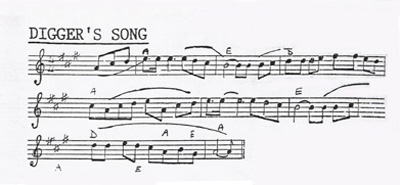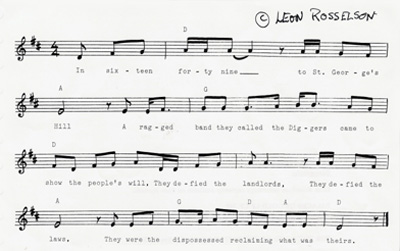The Danish Peace Academy
Greenham Common Women's Peace Camp Songbook
25 Digger's Song [The World Turned Upside Down]
 |
|
Original notes in the
songbook.
Written for women's voices? |
 |
|
Leon Rosselon's
notes.
|

In 1649, St George's Hill,
A ragged band they called the Diggers,
Came to show the people's will.
They defied the landlords.
They defied the laws,
They were the dispossessed
Reclaiming what was theirs.
We come in peace they said
to dig and sow,
We come to work the lands in common
And to make the waste ground grow.
This earth divided
We will make whole
So it will be a common treasury for all.
The sin of property we do disdain,
No man has any right to buy and sell,
The earth for private gain.
By theft and murder they took the land,
Now everywhere the walls spring up at their command.
They make the laws to chain us well,
The clergy dazzle us with heaven,
Or they damn us into hell.
We will not worship the God they serve,
The god of greed who feeds the rich.
While poor folk starve.
We work, we eat together we need no swords.
We will not bow to the masters,
Or pay rent to the lords.
Still we are free, though we are poor.
You diggers all, stand up for glory,
Stand up now.
From the men of property, the orders came,
They sent the hired men and troopers
To wipe out the diggers'claim,
Tear down their cottages, destroy their corn
They were dispersed,but still the vision lingers on.
You poor take courage, you rich take care
This earth was made a common treasury
For everyone to share
All things in common, all people one
We come in peace
The order came to cut them down.
[Text: Leon Rosselson, 1981.
Recordings: Leon Rosselson: Rosselsongs, Fuse Records CFCD
001.
Hear The World Turned Upside Down sung by Leon Rosselon.
Other recordings of Leon Russelson song: You
Poor Take Courage.
http://www.seedstar.net/undeep/diggers.html
The Diggers movement in English history
The Diggers movement began in Surrey April 1, 1649, two months after the execution of King Charles I. The name comes from the practice of digging and manuring the 'waste' and common land, which was what they did both to grow food and to show that everybody had a right to enjoy the Earth and its fruits. The Diggers believed that freedom from poverty, hunger and oppression could be won if the Earth were made a 'Common Treasury for all'. They set up communal settlements and encouraged everybody to come and join them. The brutality of their opponents meant they did not survive for long.
The Diggers were harassed by legal actions and mob violence, and by the end of March 1650 their members were driven off the St. George's Hill. Despite this setback they continued their work on a nearby heath in Cobham. colony was dispersed. In April the Digger movement collapsed when a Parson Platt, the lord of the manor, and several others destroyed the Diggers' houses, burned their furniture, and scattered their belongings. Platt threatened the Diggers with death if they continued their activity and hired several guards to prevent their return to the heath. Winstanley recorded these events as well as a final defense of the Digger movement.
There is a third, or rather a first Digger song, possibly written by the founder of the Digger's, Gerard Winstanley:
The Digger Songs
Levellers and Diggers
You noble Diggers all, stand up now, stand up now,
You noble Diggers all, stand up now,
The wast land to maintain, seeing Cavaliers by name
Your digging does maintain, and persons all defame
Stand up now, stand up now.
Your houses they pull down, stand up now, stand up now,
Your houses they pull down, stand up now.
Your houses they pull down to fright your men in town
But the gentry must come down, and the poor shall wear the
crown.
Stand up now, Diggers all.
With spades and hoes and plowes, stand up now, stand up now
With spades and hoes and plowes stand up now,
Your freedom to uphold, seeing Cavaliers are bold
To kill you if they could, and rights from you to hold.
Stand up now, Diggers all.
Theire self-will is theire law, stand up now, stand up now,
Theire self-will is theire law, stand up now.
Since tyranny came in they count it now no sin
To make a gaol a gin, to starve poor men therein.
Stand up now, Diggers all.
The gentrye are all round, stand up now, stand up now,
The gentrye are all round, stand up now.
The gentrye are all round, on each side they are found,
Theire wisdom's so profound, to cheat us of our ground
Stand up now, stand up now.
The lawyers they conjoyne, stand up now, stand up now,
The lawyers they conjoyne, stand up now,
To arrest you they advise, such fury they devise,
The devill in them lies, and hath blinded both their eyes.
Stand up now, stand up now.
The clergy they come in, stand up now, stand up now,
The clergy they come in, stand up now.
The clergy they come in, and say it is a sin
That we should now begin, our freedom for to win.
Stand up now, Diggers all.
The tithes they yet will have, stand up now, stand up now,
The tithes they yet will have, stand up now.
The tithes they yet will have, and lawyers their fees crave,
And this they say is brave, to make the poor their slave.
Stand up now, Diggers all.
'Gainst lawyers and 'gainst Priests, stand up now, stand up
now,
'Gainst lawyers and 'gainst Priests stand up now.
For tyrants they are both even flatt againnst their oath,
To grant us they are loath free meat and drink and cloth.
Stand up now, Diggers all.
The club is all their law, stand up now, stand up now,
The club is all their law, stand up now.
The club is all their law to keep men in awe,
But they no vision saw to maintain such a law.
Stand up now, Diggers all.
The Cavaleers are foes, stand up now, stand up now,
The Cavaleers are foes, stand up now;
The Cavaleers are foes, themselves they do disclose
By verses not in prose to please the singing boyes.
Stand up now, Diggers all.
To conquer them by love, come in now, come in now
To conquer them by love, come in now;
To conquer them by love, as itt does you behove,
For hee is King above, noe power is like to love,
Glory heere, Diggers all.
Source: The English Diggers (1649-50) : Background
material (English Diggers &c.)
http://www.diggers.org/english_diggers.htm
Roy Palmer: A Ballad History of England: From 1588 to the Present
Day, B.T. Batsford Ltd, London, 1979.
The (English) Digger Writings : A chronological index
to the publications of Gerrard Winstanley and the Diggers,
1648-1652.
http://www.diggers.org/digger_tracts.htm
Se also:
http://www.exlibris.org/nonconform/engdis/diggers.html
The Surrey Diggers were also responsible for the publication of the songs The Diggers Mirth and The Diggers Song. The authorship of these songs is uncertain. C.H. Firth, who edited The Clarke Papers, in which The Diggers Song first appeared, suggests that Winstanley was its author, a suggestion which has been repeated by many later commentators on Winstanley's writings. However, there does not appear to be any firm evidence to support this claim, or L.H. Berens' suggestion that Robert Coster was author of the first part of The Digger's Mirth and Winstanley author of the second part. [n4. The Clarke Papers II, edited by C.H. Firth (London: Camden Society, 1894) pp. 221-4; L.H. Berens, The Digger Movement in the Days of the Commonwealth, (London: 1906) p. 129.]
Hopton, Andrew, ed. Digger Tracts, 1649-50 /
edited and introduced by Andrew Hopton.. - London : Aporia,
1989.
http://phoenixandturtle.net/excerptmill/hopton.htm ]